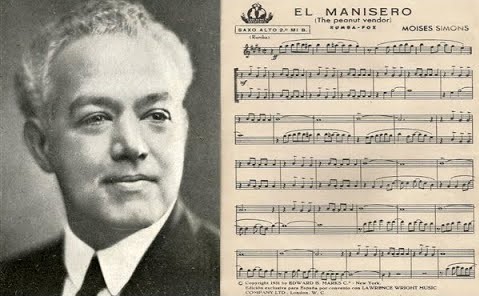Simons, “El Manisero,” and the Spark of Everyday Genius

It didn’t emerge from deep contemplation, nor from the introspective musings of bards plumbing the depths of the creative spirit. When Moisés Simons composed El Manisero, it took him very little time. The reason, according to one of the most well-known accounts, was a request by the legendary Rita Montaner, which the Cuban composer gladly accepted. From that commission would be born one of the most iconic pieces in the history of Cuban music. “Rita said that in just a ‘momentico’—as he typically wrote all his music—the inspired composer wove together a creole melody filled with sweet and enticing accents, full of irresistible charm,” wrote essayist and researcher Rafael Lam.
El Manisero has been interpreted from New York to Paris. In Cuba, a particularly striking instrumental adaptation was arranged by Armando Romeu, featuring complex, virtuosic passages blending Afro-Cuban jazz and blues with the grandeur of big band style. It was premiered and recorded by the Orquesta Cubana de Música Moderna. Simons’s work would later extend to operettas and musical comedies, all marked by a deep linguistic and stylistic connection to Cuban rhythms and themes. Among his notable stage works are A una rosa and the comedy Niña Mercé, premiered in Paris and Madrid respectively, as noted by journalist Oni Acosta, who considers Simons an essential figure in Cuban music and an unavoidable reference in Cuban cultural heritage.
Born on August 24, 1889, Moisés Simón Rodríguez was introduced to music at a young age, encouraged by his father. By age 14, he could already play multiple instruments, had led children’s theater troupes at Havana’s Teatro Martí, and studied under several prominent teachers who shaped his development as a composer. These included José Mauri (counterpoint), and Fernando Carnicer, Felipe Patau, and Ignacio Tellería (composition).
Though El Manisero catapulted him to fame, Simons had already built a solid career performing and arranging with various ensembles. He worked as an organist, conductor, and orchestrator, performing in many of Cuba’s most prestigious venues—including the National Theatre—and touring the Caribbean and Central America.
In the 1930s, Simons embarked on a European tour, performing in Spain and France. His crowning achievement came in France with the premiere of his operetta Toi c’est moi on October 18, 1934, at the Théàtre des Bouffes-Parisiens, one of Europe’s premier venues for light opera. Written in collaboration with novelist Henri Duvernois, the production featured prominent French performers and marked a pivotal moment in Simons’s career and musical maturity.
Two years later, the Cuban maestro premiered Le chant des tropiques in Paris. The cast included soprano Hélène Regelli, Jean Sablon, Roger Bourdin of the Paris Grand Opera, and Cuban singer Antonio Machín, who performed El Manisero. That production also featured the song Cubanacán, later recorded by stars like Tino Rossi, Jean Sablon, Georges Till, and Raquel Meller.
After the Nazi occupation of France during World War II, Simons moved around the French countryside before relocating to Madrid. There, he composed the score for the film Bambú, including the song Hoy como ayer, performed by stars such as Imperio Argentina and Celia Gámez. In 1944, he premiered Toi c’est moi in Spanish, with a translated libretto by Federico Shaw.
When Moisés Simons passed away on June 28, 1945, he left behind a significant body of work. In addition to his most famous compositions, his catalogue includes Deuda de Amor, an operetta with a libretto by Fermín Samper premiered in 1913 at Havana’s Teatro Albisu; La Negra Quirina, a 1914 revue; El Pescador de Corales; the two-act revue El Hilo de la Vida; La Cueva de los Mochuelos; and Niña Mercé, staged at Madrid’s Teatro Calderón in 1931, among others, as detailed by researcher Mirna Guerra.
Several of his works were adapted for the silver screen in films such as I Like You Never, The Big Idea, The Cuban Love Song, Bosko’s Knight-Mare, Here Comes the Band., Toi c’est moi, Twenty Million Sweethearts, Romance del Palmar, Lumières de Paris, and Sucedió en La Habana.
Translated by Luis E. Amador Dominguez
Photo: Radio Cadena Habana on YouTube



